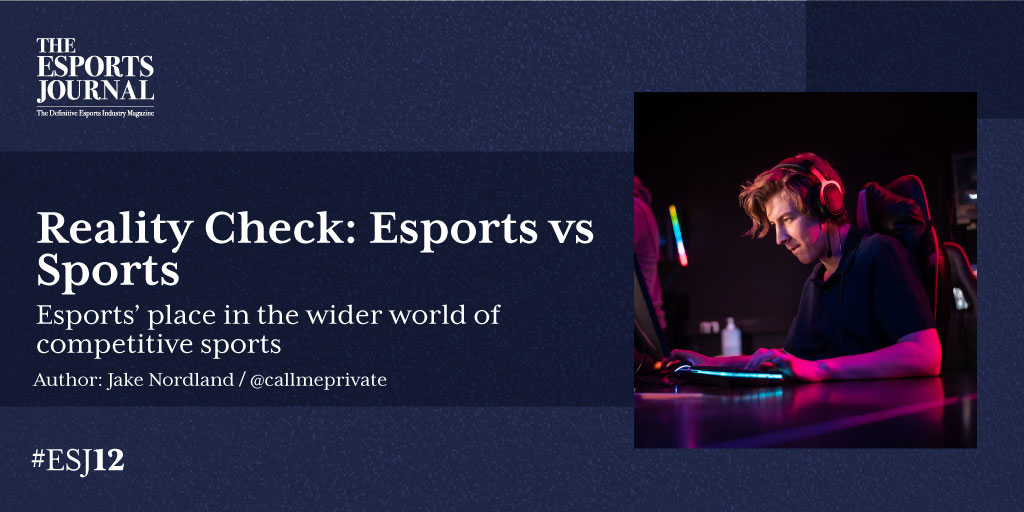This article was originally published in Esports Insider’s print magazine The Esports Journal Edition 12 on April 4th 2023. You can buy a print copy here or read the edition online for free here.

Where esports sits in relation to sports is the industry’s ultimate ontological debate.
Countless news op-eds, heated Tweets and Reddit threads have played out tired arguments over whether esports is, or isn’t, a sport. The most astute amongst them have come to the conclusion that, well, the answer doesn’t really matter. Nonetheless, there are key similarities and differences between the two sectors that point to convergent, albeit distinct, industry trajectories.
One thing that is certain: despite gloomy headlines about recessions and layoffs, esports is as popular as ever. The COVID-19 pandemic induced a monumental boom in interest and viewership in esports, and while some of that has naturally corrected as health measures eased and life gradually normalised around the world, viewership on the whole is still firmly in the green compared to 2019.
Six different esports titles in 2022 had peak concurrent viewership numbers in the multi-millions, according to Esports Charts data, top amongst them League of Legends’ 2022 World Championship at over 5m peak viewers (excluding Chinese viewership, which is harder to measure). Riot Games itself puts that figure much higher, claiming Worlds 2021 saw 74m peak concurrent viewers (presumably including Chinese figures).
CS:GO all-time viewership records have also been set in the last two years, with the three most recent majors — IEM Rio Major 2022 (1.4m peak viewers), PGL Major Antwerp 2022 (2.1m), and PGL Major Stockholm 2021 (2.7m) the three most popular CS:GO events ever.
Globally, the esports audience is projected to rise to 641m by 2025, according to analytics firm Newzoo. By contrast, that audience numbered just 398m viewers in 2019. Video game live streaming more broadly, while down from 2021, is still double pre-pandemic levels, analytics company Stream Hatchet found.
These numbers aren’t quite what traditional sports offers, though. While five or even tens of millions is impressive, it is no football or American football, which can command hundreds of millions of average viewers. Nevertheless, the gains indicate sustained audience interest, and are promising for esports professionals hoping to cultivate the fan followings seen in traditional sports.
In fact, despite a global economic downturn and a considerable softening in the attractiveness of esports in the eyes of investors, esports has still enjoyed endorsements and investments from a variety of entities.

There were 31 merger & acquisition deals worth $2.1 billion (~£1.7 billion) announced between Q1 and Q3 2022, according to investment bank Drake Star. In October 2022 alone, GAMURS Group raised $12m (~£10.6m), Bidstack raised around $11m (~£9.9m), and football players Bruno Fernandes and Juan Mata became shareholders of Rebels Gaming.
Fernandes and Mata are far from the only individuals from the professional sports world invested in nurturing esports. Household sporting names — such as Michael Jordan, Usain Bolt, David Beckham, and Mike Tyson, to name a few — are funding and recognising the value of esports, extending their traditional sporting careers into a new domain.
High-profile sporting names endorsing esports in an effort to promote their investments speaks to the cross-over appeal that many see between the two sectors. Celebrity endorsements, it is hoped, may lead sports audiences to cross over and support counterparts in esports. In a sign of that hope, numerous European football clubs have launched, or endorsed, esports teams, including Paris Saint-Germain (PSG), Manchester United, Barcelona F.C., Schalke 04, and many more.
Plus, while viewership numbers might be lower, esports audiences are highly sought after. Audience demographics typically comprise young, higher-income, tech-savvy males — a valuable target audience for marketers that traditional sports increasingly misses, and a goldmine for traditional sports clubs to find new fans.
Governments, too, are starting to take steps to endorse esports, keen to reap the value of an industry that had traditionally been at best ignored from a legislative standpoint. China, South Korea, India, and the US, among others, have already officially recognised esports as a sport or introduced legislation to aid esports athletes. In November 2022, the European Union passed a resolution recommending a long-term strategy to support and fund esports on the continent, recognising the value it provides.
Most national governments across the world provide support and funding to their sports industries, which is vital to enabling and promoting sporting activity. The extension of support to the esports industry brings competitive gaming closer to par with traditional sports. As EU legislators determine how best to implement funding and support, esports enterprises will likely take a new and close look at opportunities in Europe.
However, one of the emerging narratives of the last few years is the diversification of revenue streams by esports businesses. Many esports organisations, most notably FaZe Clan, are now as much about gaming and lifestyle as they are about esports. Others have dived headfirst into the influencer industry; Misfits Gaming announced a $20m (~£17.8m) creator and influencer fund in November, and Team Liquid has an influencer management arm (and esports wiki). XSET is forging a focus on content and talent, and 100 Thieves is even making its own video game.
That emphasis on business diversification is one key area where esports has differentiated itself from traditional sporting disciplines. Rampant diversification away from competition itself is not a necessity in sport, but it is a vital lesson for those entering the esports industry.
“At American Public University System, we differentiate between Sports Management, and our new Esports degree that focuses on the business of esports and training future esports coaches and administrators,” explained Craig Skilling, Esports Coordinator at APUS, an accredited online university which offers accessible online higher education Esports degrees. APUS’ esports course examines esports from a business perspective — recognising the need to differentiate esports from sports management as the industry evolves and opens up new opportunities for employment.

Going forward, however, Skilling reasons that an increased emphasis on content creation as a revenue strategy may expose events to larger audiences, granting top players the star power status typically enjoyed in traditional sports media and paving the way to frame stars in a similar limelight to greats in the NFL or NBA.
Additionally, from an event perspective, more and more local destination marketing organisations, Convention and Visitors Bureaus (CVB’s) and local governments — particularly in the US — are bidding to host esports tournaments as they come to appreciate its distinct economic benefits.
In much the same way that traditional sports has been an economic focal point for many municipalities, those same areas are recognising that economic benefits apply equally to esports. The city of Raleigh, North Carolina, for example, is booked heavily in 2023 for esports events — thanks to generous incentives and funding. The US state of Georgia, too, is using tax incentives to boost its esports industry.
Nowhere is esports becoming more quickly physically ingrained than on university campuses across the US and beyond. More universities and colleges are treating their esports programmes as they would their American football programmes, investing both money and training to grow their departments.
Hundreds of US colleges and universities are members of the National Association of Collegiate Esports (NACE) and offer recognised varsity esports programmes. Skilling emphasised that other institutions may well follow suit in response to the trend by developing their own varsity programmes moving forward. In fact, APUS’ esports degree was formed as a response to organic interest in its varsity programme.

“Demand at APUS began from an organic student-led club that pushed for more esports options within the school. Today, we offer an online bachelors in esports, drawing from our sports management programme to expose future professionals to all aspects of the growing industry,” Skilling added.
“Esports can and will permeate the wider world of competitive sports eventually, and we see this reflected in the student body at APUS. Currently, we have several students who are competing on their own and who have experience running their own teams.”
The Esports Coordinator expects more collegiate teams to secure formal varsity designation to assist in a business model that drives student scholarship funding — just like traditional sports. Growing varsity designation could be integral as it opens the door to name, image and likeness (NIL) marketing for esports college athletes, a commonplace occurrence in US collegiate sport but thus far largely absent from esports.
However, there are signs of change ahead. In June 2022, a policy shift from the National Collegiate Athletic Association on NIL provided more clarity for content creators contemplating college esports. The policy change allowed individuals to compete in other intercollegiate sports while also being signed to a competitive esports organisation or operating as a sponsored gamer or streamer.
From the business side to the competitive side, parallels that run between esports and sports are only getting stronger — and closer. Esports is learning from its traditional counterpart, while also forging its own, unique way forward.
“Does esports differ from traditional sports? Yes and no,” reflected Skilling. “No in terms of the hours of training that are required for high level athletes, whether gamers or traditional sports athletes. However, it is a yes from a business standpoint, which is a core focus of the APUS esports programme. We see that esports events, streaming, and overall monetisation exceeds that of some of our professional sports leagues.”
